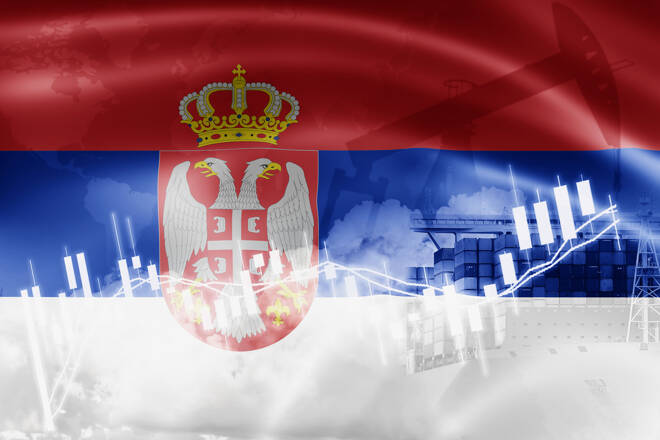Advertisement
Advertisement
Serbia: Growth Momentum, Policy Discipline Cushion Economic Blows From War in Ukraine
By:
Serbia is on course for solid growth of 3% and 4% in 2022 and 2023, as government policies help the economy to withstand shocks from Russia’s war in Ukraine and rising inflation.
The Russia-Ukraine war represents a substantial exogenous shock to Serbia’s small, open economy. Effects of the war add to strong inflationary pressures in the short term by raising international prices for commodities and food, squeezing household and corporate budgets and placing pressure on external finances.
We forecast average yearly headline inflation of around 9% in 2022 (Figure 1), broadly in line with that of peer economies, with Serbia’s current-account deficit to widen to 6% of GDP this year from 4.4% of GDP in 2021, mainly due to the impact of higher energy and other commodity prices.
Figure 1. Energy and food prices fuel headline inflation; core inflation still relatively low
Headline inflation (CPI, YoY, %) and contributions (percentage points)
Serbia’s medium-run growth outlook remains favourable
Despite increased economic uncertainties, Serbia’s medium-run growth outlook remains favourable.
After projected economic growth of 3% this year, growth is expected to stabilise around 4% in 2023, broadly in line with the economy’s growth potential of 4-4.5% over the medium term. Underpinning the economy’s expansion is planned investment in transport and green infrastructure, with financing from a debut EUR 1bn green bond issued last year, as well as from steady foreign direct investment.
Scope Ratings assigned Serbia a first-time credit rating of BB+ with Stable Outlook on 3 June, accounting for a number of the country’s vulnerabilities, including reliance on foreign-currency funding of the public and private sectors, structural current-account deficits and institutional deficiencies.
At the same time, Serbia benefits from disciplined monetary policy, which has abetted relatively stable exchange-rate dynamics and adequate forex reserves contributing to low pre-crisis inflation.
Despite significant hard-currency sales of a net EUR 2.3bn over the first four months of 2022 to protect the exchange rate, the National Bank of Serbia’s gross forex reserves of EUR 14.1bn at end-April are comfortable, covering five months’ worth of imports and equivalent to twice outstanding short-term external debt.
Headline trade exposure to Russia and Ukraine is material but not outsized
Serbia’s trade exposure to Russia and Ukraine is material but not outsized. Russia accounts for less than 4% of Serbia’s aggregate goods exports and slightly more than 5% of its goods imports with almost half of the latter reflecting oil and gas importing. Ukraine makes up less than 1% of Serbia’s exports and imports of goods.
We expect no major disruptions of Russian gas supply to Serbia via the pipeline running through Bulgaria. However, an EU embargo of Russian oil could have a material adverse economic impact, as Serbia relies on supplies transported via EU countries, including Croatia. Serbia imports almost 90% of its gas and 60% of its oil from Russia.
Missing from the government’s policies are far-reaching institutional reform and stronger rule of law
Economic and foreign policy continuity has been observed so far under the presidency of Aleksandar Vučić, including a commitment to balance fiscal discipline and growth – benefitting from IMF policy support. Missing are far-reaching institutional reforms to curtail long-standing public-sector inefficiencies, notably in Serbia’s large and inefficient state-owned enterprises’ sector, which weighs on fiscal performance, as well as greater respect for the rule of law.
The government faces a difficult task in balancing its relations with Russia – given reliance on energy imports from Russia, including a recent three-year gas deal – and the countries’ other political objectives, such as economic and institutional convergence with the EU, without jeopardising future reforms and investor confidence.
Broader normalisation of relations between Serbia and Kosovo, a precondition for Serbia’s EU accession for which the date is likely to be delayed considerably from a planned 2025, remains a longer-run challenge.
For a look at all of today’s economic events, check out our economic calendar.
Levon Kameryan is Associate Director in Sovereign and Public Sector ratings at Scope Ratings GmbH.
About the Author
Levon Kameryancontributor
Levon graduated with a M.Sc. in International Economics and Public Policy from the University of Mainz in 2016. Levon worked previously as an economist at the Central Bank of Armenia.
Advertisement
